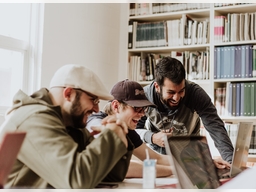Peer Evaluation of Group Process and Function √ §
Panelists share how they hold students accountable in groups
Location
Online
Date & Time
March 9, 2023, 12:00 pm – 1:00 pm
Description
If you use groups or teams regularly in classes, you know that group function is not always smooth–some students may dominate while others gladly let others do most of the work. These social issues can be especially problematic if students receive a grade for some aspect of the group work. One common way to hold students accountable for their efforts in these situations is peer evaluation. In this session, faculty panelists will share insights from their use of peer evaluation, including ways both to teach students how to work well in groups and to evaluate group function. These techniques can be implemented in various group settings including projects, class work done in groups, or Team-Based Learning. Panelists include Mark Berczynski (ECEP), Mariajosé Castellanos (CBEE), Milvia Hernández (MLLI), Sarah Leupen (BIOL), and Christopher Rakes (EDUC).
Please click “Going Virtually” below to reserve your seat for this
session, and we will send you a Google calendar invitation with a WebEx
link one hour before the session. If you register less than an hour
before the session, you will receive the WebEx link when you register.
Please email fdc@umbc.edu
if you have any questions. If you have registered and find that you can
no longer attend, please kindly release your spot so that others may
attend.
√ Counts toward the ALIT Certificate
§ Counts toward the INNOVATE Certificate
§ Counts toward the INNOVATE Certificate
Photo by Priscilla Du Preez on Unsplash.
Part of the FDC Advanced Topics Series
Launched in September 2021!
Sessions in this series are designed to delve deeper into special topics that synthesize multiple research-based ideas for cultivating student learning. During these sessions, faculty and staff colleagues will support your efforts to energize your classroom with classic and cutting-edge pedagogical approaches that will help you to ...
Launched in September 2021!
Sessions in this series are designed to delve deeper into special topics that synthesize multiple research-based ideas for cultivating student learning. During these sessions, faculty and staff colleagues will support your efforts to energize your classroom with classic and cutting-edge pedagogical approaches that will help you to ...
- Identify how to integrate complex learning science applications into your course design and delivery,
- Challenge your higher order thinking skills to investigate and assess new ways to foster student success, and
- Connect and collaborate with colleagues seeking to create exemplary learning exercises and environments across courses and learning opportunities.
- aspire to complicate and build on core pedagogical knowledge shared in other FDC programs, or
- wish to cultivate and apply learning research to innovative, engaging, and effective classroom practices.
